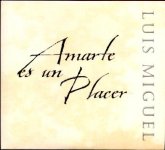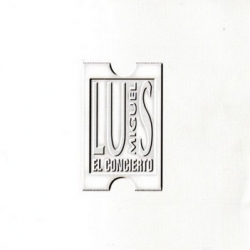
Luis Miguel Gallego Basteri is a Mexican singer and record producer. Born in Puerto Rico to an Italian mother and a Spanish father, he is often referred to as El Sol de Mexico, derived from the nickname his mother gave him as a child: "Mi sol". Luis Miguel has sung in multiple genres and styles, including pop songs, ballads, boleros, tangos, jazz, big band, and mariachi. Luis Miguel is also recognized as the only Latin singer of his generation not to cross over to the Anglo market during the "Latin Explosion" in the 1990s.

Mexican recording artist Luis Miguel has released 21 studio albums, 30 compilation albums, three extended plays (EP) two live albums, two soundtrack albums and five box set. Luis Miguel has sold over 60 million records, making him one of the best-selling Latin music artists of all time. Luis Miguel is also the artist with the second-most number ones on the Billboard Top Latin Albums chart with nine albums. At the age of 11, he released his debut studio album, Un Sol (1982), which was certified platinum and gold in Mexico. The artist would release four more studio albums under the record label EMI: Directo al Corazón (1982), Decídete (1983), También es Rock (1984), and Palabra de Honor (1984). A Portuguese-language version of Decídete and Palabra de Honor were released in Brazil as Decide Amor and Meu Sonho Perdido, respectively. Luis Miguel made his acting debut in the film as the lead role on Ya nunca más (1984) and recorded its soundtrack. In 1985, he participated in the Sanremo Music Festival 1985 with the song "Noi ragazzi di oggi"; it placed second in the Big Artist category and was later included on the Italian-language edition of Palabra de Honor. In the same year, Luis Miguel recorded the soundtrack for the film Fiebre de amor, which he co-starred with fellow Mexican singer Lucero.

Romances is the twelfth studio album by Mexican singer Luis Miguel, released on 12 August 1997, by WEA Latina. It is the third album of the Romance series, in which Miguel covers Latin songs from 1940 to 1978. Aside from Miguel, the production also involved arranger Bebu Silvetti, and Armando Manzanero, who directed all of Miguel's Romance albums. Romances consists of twelve cover versions and two new compositions by Manzanero and Silvetti. Recording took place in early 1997 at the Ocean Way recording studio in Los Angeles, California.

Romance is the eighth studio album by Mexican singer Luis Miguel. It was released by WEA Latina on 19 November 1991. Although the production was originally intended as another collaboration with Juan Carlos Calderón, that plan was scrapped when Calderón was unable to compose songs for the album. Facing a new-material deadline in his recording contract, at his manager's suggestion Miguel chose bolero music for his next project. Mexican singer-songwriter Armando Manzanero was hired by WEA Latina to co-produce the album with Miguel. Recording began in August 1991 at Ocean Way Recording in Hollywood, California, with Bebu Silvetti the arranger.

Segundo Romance is the tenth studio album by Mexican singer Luis Miguel, released on 30 August 1994 through WEA Latina. Like Miguel's 1991 album Romance, Segundo Romance comprises cover versions of boleros written between 1934 and 1993. It was produced by Miguel with Juan Carlos Calderón, Kiko Cibrian and Armando Manzanero and recorded in early 1994 at the Record Plant in Los Angeles.

Aries is the ninth studio album by Mexican recording artist Luis Miguel. It was released by WEA Latina on 22 June 1993. After attaining commercial success in 1991 with his previous album, Romance, Luis Miguel decided to return to a style similar to his earlier work, featuring pop ballads and dance numbers with R&B influences. The record was produced by Miguel, who was assisted by Kiko Cibrian, Rudy Pérez, David Foster, and Juan Luis Guerra.

"Amarte Es un Placer" is a song recorded by Mexican singer Luis Miguel and the fourth and final single from his album of the same name (1999). Released in 2000, it was written by Juan Carlos Calderón, while production was handled by Miguel. Lyrically, "Amarte Es un Placer" deals with a narrator describing the pleasures of being enamored with his lover.

Nada Es Igual is the eleventh studio album by Mexican recording artist Luis Miguel. It was released by WEA Latina on 20 August 1996. The album has a musical style similar to his previous pop album Aries (1993) on which Miguel performs power ballads and R&B tunes. Recording took place at the Record Plant Studios in February 1996, with production handled by Miguel and his longtime associate Kiko Cibrian. Its songwriting was assisted by Cibrian, Rudy Pérez, and Alejandro Lerner. The album was promoted by three singles: "Dame", "Cómo Es Posible Que a Mi Lado", and "Que Tú Te Vas"; the former became the most successful single reaching number two and number one on the Billboard Hot Latin Songs and Latin Pop Songs charts, respectively. To further promote the recording, Miguel launched the Tour America 1996 where he performed in several South American countries.

Mis Romances is the fourteenth studio album of Mexican singer Luis Miguel, released on 20 November 2001 by Warner Music Latina. It is the fourth album in the Romance series wherein Luis Miguel covers bolero standards from Latin America and includes two original compositions. Produced by Luis Miguel, the album was recorded at the Record Plant in Los Angeles, California with the participation of the Royal Philharmonic Orchestra at the Abbey Road Studios in London, England. The recording was promoted by three singles: "Amor, Amor, Amor", "Cómo Duele", and "Al Que Me Siga". It was further promoted by a tour in 2002 that had Luis Miguel performing in the United States, Latin America, and Spain. It was the highest-grossing tour of the year by a Latin artist in the U.S.

México en la Piel is the sixteenth studio album by Mexican singer Luis Miguel. Released on 9 November 2004 by Warner Music Latina, it is Miguel's first mariachi album. The record contains thirteen mariachi covers, accompanied by the Vargas de Tecalitlán folk ensemble. Armando Manzanero was its musical director, and Miguel its producer. The album was recorded at Ocean Way Recording in Hollywood, California in July 2004. A special edition, México en la Piel: Edición Diamante, was released on 5 September 2005 with two additional songs and a DVD with five music videos. Four singles were released from the album: "El Viajero", "Que Seas Feliz", "Sabes una Cosa", and "Échame a Mí la Culpa". "Mi Ciudad" was released as a single from the special edition.

33 is the fifteenth studio album by Mexican singer Luis Miguel. It was released through Warner Music Latina on 30 September 2003. It is a pop record which contains pop ballads and uptempo disco numbers. The album was produced by Miguel and recorded in Hollywood, California. 33 was promoted by two singles: "Te Necesito" and "Un Te Amo". It was also promoted by a tour which lasted from 2003 to 2004. Several songwriters including Armando Manzanero, Juan Luis Guerra, and Kike Santander contributed to the compositions in the record.

Grandes Éxitos is a greatest hits album by Mexican singer Luis Miguel. Released on 22 November 2005 by Warner Music Latina, the album features 24 previously recorded songs from Miguel's career with his record label as well as two new songs ; both songs were released as singles from the album. A special edition of the record was also released and features six extra songs as well as a DVD containing music videos from Miguel's career. Grandes Éxitos received a favorable review by AllMusic critic, Thom Jurek who commended Miguel's trajectory as an artist. Commercially, it reached number one in Mexico and the top ten in Argentina, Spain, Portugal, and the Billboard Top Latin Albums chart in the United States. It was certified Multi-Platinum in Mexico and the United States (Latin) and Platinum in Spain.

El Concierto is the second live album by Mexican recording artist Luis Miguel, released on 17 October 1995 by WEA Latina. It was recorded from his performances at the National Auditorium in Mexico and at the José Amalfitani Stadium in 1994 during his Segundo Romance Tour. The album features live covers of José Alfredo Jiménez's songs, which were previously unreleased. The first two songs were released as singles, the former reaching number one on the Billboard Hot Latin Songs chart and the latter peaking at number three on the same chart.

The Mis Romances Tour was a concert tour performed by Luis Miguel during the year 2002 to promote his 2001 album Mis Romances. The tour consisted in 63 concerts and ran through US, Mexico, Argentina, Spain, Chile, Uruguay, Peru, Dominican Republic and Puerto Rico. In February he performed at the Universal Amphitheatre in Los Angeles, California for six consecutive sold-out nights drawing more than 32,000 spectators, beating his previous record of five consecutive concerts in this venue, he played also two more concerts in September. Miguel performed at Mexico's Aztec Stadium for first time in his career in front of 80,000 spectators, and also gave twelve nights at National Auditorium in Mexico City.

"Por Debajo de la Mesa" is a song written by Armando Manzanero and performed by Mexican recording artist Luis Miguel. Arranged by Bebu Silvetti, it was one of the two original compositions written for Miguel's fifteenth studio album Romances. It was released as the lead single from the album on 15 July 1997 and it became his thirteenth number-one single on the Billboard Hot Latin Songs chart in the United States. The music video features Miguel performing at a fine-dining restaurant in New York City.

"O Tú o Ninguna" is a song written by Juan Carlos Calderón and produced and performed by Mexican singer Luis Miguel. The song is a bolero in which the protagonist cannot envision his life without anyone else besides his love interest. It was released as the second single from the album Amarte Es un Placer on 6 September 1999. The track topped the US Billboard Hot Latin Songs chart; and reached the top-five in Guatemala, Nicaragua and Panama.
"Contigo En La Distancia" is a bolero which was written by the Cuban singer-songwriter César Portillo de la Luz when he was 24 years old. It was written in the year 1946.

"Hasta Que Me Olvides" is a song by Mexican singer Luis Miguel from his ninth studio album, Aries (1993). The song was composed by Dominican Republic singer-songwriter Juan Luis Guerra with Miguel and Kiko Cibrian handling the production. It was released as the album's second single in August 1993 by WEA Latina. A sentimental ballad, the song narrates the protagonist who insists on loving his partner until he is forgotten.
"No Sé Tú" is a song written and performed by Mexican singer-songwriter Armando Manzanero, released from his studio album, Cariñosamente (1986). A popular bolero song, the lyrics describe the protagonist unable to stop thinking about his lover. Manzanero re-recorded "No Sé Tú" as a duet with Francisco Céspedes on Manzanero's album Duetos (2001). It was listed among Manzanero's best songs by an editor for BBC Mundo.


















